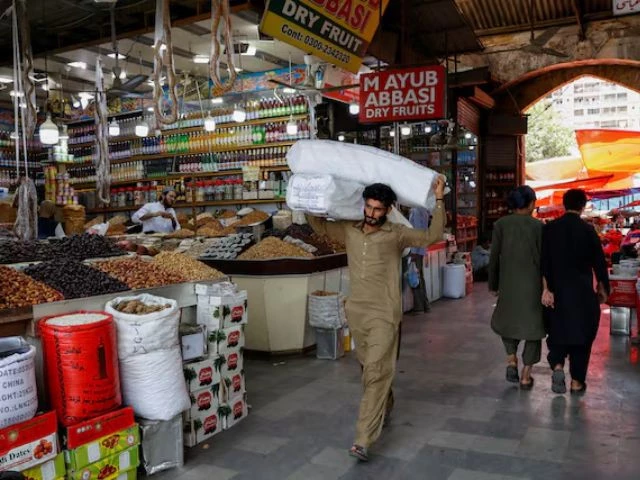Pakistan tells IMF it will miss tax goal
Govt banks on inflation, growth and solar imports to recoup Rs190b losses

Pakistan informed the International Monetary Fund (IMF) on Friday that it will not be able to achieve this quarter's Rs3.1 trillion tax target but hoped to recoup the shortfall through inflation, economic growth and higher imports of solar panels.
In a briefing to the IMF delegation, tax authorities said the July-September target would be missed by a significant margin. In a separate meeting, the Power Division apprised the lender about developments in the power sector, particularly settlement of Rs1.25 trillion circular debt through bank borrowings.
The talks are taking place for release of a $1 billion loan tranche under the Extended Fund Facility (EFF) and another $220 million under the Resilience and Sustainability Facility (RSF).
During the meeting with the Federal Board of Revenue (FBR), the IMF inquired about revenue projections and the impacts of floods on collection this fiscal year. The government has set the Rs14.13 trillion annual target, which may also be missed like last year when the FBR fell short by over Rs1.2 trillion.
Against the July-September target of Rs3.08 trillion, the FBR told the IMF collection may remain below Rs2.95 trillion, said sources. The government hoped to recoup the shortfall from November once economic activities pick up.
Similar hopes were made last fiscal year but remained unfulfilled.
Although a separate session on macroeconomic projections is due next week, tax authorities see the economy growing over 3% this fiscal year despite floods. They also projected inflation picking up due to flood-related supply disruptions, said sources. These two factors may offset some revenue losses.
The Customs Department briefed the IMF about implications of the reduction in regulatory duties. It said import tax collection increased 16% during the first two months. Officials hoped contingency measures would not be needed to offset duty reduction.
Imports grew 9% in dollar terms and in double digits in rupee terms, offsetting duty cuts.
The IMF was told that Rs190 billion projected through enforcement measures will be paid with annual returns. The government hopes the 10% tax on sales in erstwhile FATA will also boost collection.
The FBR also had to back off from an immature proposal to add estimated fair market value in tax returns.
After the faux pas, Prime Minister Shehbaz Sharif formed a committee chaired by Law Minister Senator Azam Nazeer Tarar to examine the new column in IRIS tax returns requiring filers to declare estimated fair market value of assets, assess implications, and recommend corrective measures.
The committee met on September 26. After deliberations, it recommended removing the column in the interest of simplifying filing. The recommendation was submitted to and approved by the prime minister.
The FBR had claimed the column was solely for data collection to support the Economic Survey, not income or tax liability. But the claim did not hold ground.
Tax authorities hoped increased solar panel imports would offset shortfalls. The IMF had budgeted Rs18 billion revenues from the 10% tax on solar imports. In the first two months, around Rs6 billion was already collected, said sources.
However, the FBR feared a dip in tax collection through electricity bills due to falling demand from the national grid. Grid demand is falling due to higher prices, slowdown and policies pushed by the IMF, World Bank and energy ministry.
Meanwhile, Power Minister Sardar Awais Ahmed Khan Leghari said the current structure of solar net metering remains a critical challenge to sustainable reforms. He has repeatedly stated net metering in its current form poses financial imbalance affecting the broader consumer base.
The Power Division said about 350,000 solar net metering consumers benefit from favourable buy-back rates, with the cost indirectly borne by 35 million other consumers.
Unaffordable energy prices have forced consumers to shift to solar power, and the government is struggling to lure them back as distribution companies face falling residential demand.
The Power Division also informed the IMF about progress in settling circular debt through borrowing, reducing line losses and improving bill recovery. But concerns remain about sustainability.
It said the government has already saved Rs175 billion due to falling interest rates and another Rs242 billion by reducing theft and technical losses.
Advisor to PM on Privatisation, Muhammad Ali, said HBL Chairman Sultan Allana gave full support on behalf of banks to raise Rs1.25 trillion debt for clearing dues of power producers.
"This journey started with our meeting with HBL's chairman, who assured us of full support in the national interest," said Ali. He added that although banks initially wanted a smaller number, they eventually agreed with the rationale, supported by the finance minister and State Bank leadership.
The IMF was told that the Rs1.225 trillion syndicated loan was arranged with participation of 18 banks. Repayments will be made from a dedicated surcharge already embedded in bills, guaranteeing predictability for lenders and minimising fiscal burden.
The facility addresses Rs1.225 trillion circular debt through structured Islamic financing of Bai Muajjal, Ijara Financing and floating Sukuk bonds in the stock market.
The financing has been secured at a rate 0.9% below prevailing Karachi Interbank Offered rates (KIBOR) for a maximum of six years. Repayments will be made by charging Rs3.23 on every unit consumed by paying customers.
Under the arrangement, the debt will be cleared in less than six years, with Rs350 billion savings passed onto consumers. The deal also saves Rs377 billion in late payment surcharges, reduces circular debt carrying cost by 1.5% and running financing cost by 1.5% annually.
"The prime minister's vision was that the consumer should be the winner from this exercise," said a special assistant to the PM.






1710175205-0/image-(9)1710175205-0-208x130.webp)














COMMENTS
Comments are moderated and generally will be posted if they are on-topic and not abusive.
For more information, please see our Comments FAQ